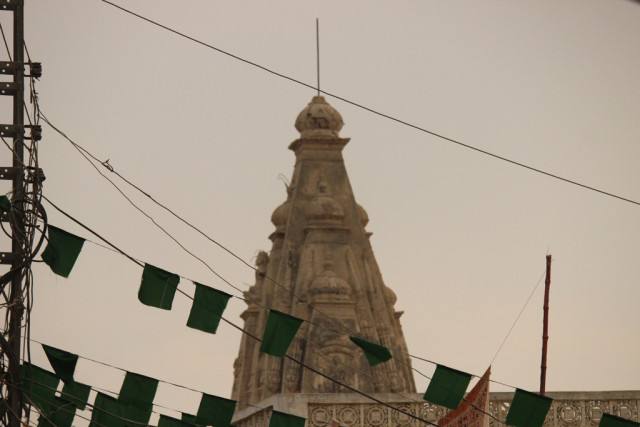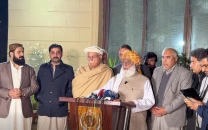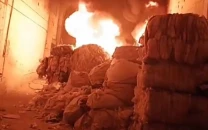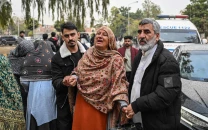Oasis in Sindh: Muslim family protecting sole Hindu temple in Johi
Despite some recent untoward incidents against Hindu community, the people of Sindh largely uphold religious harmony.

The temple is locally called ‘kubi’ and is a very prominent building. PHOTO: KAMRAN SIDDIQUI
Sikandar Chandio, 53, was born in the temple he now protects. “This is our fifth generation living on the premises of the temple. I believe it is a sacred place for some people and I don’t want this building to be damaged.”
Despite some recent untoward incidents against the Hindu community, the people of Sindh largely uphold religious harmony.
Chandio’s Muslim family ‘protects’ the only temple in Johi, a town in which no Hindu family resides. A Hindu man handed over the charge of the temple to his grandfather, Jamaluddin.
“My grandfather didn’t purchase it,” he admitted. “The Hindu man gave the possession to him through a verbal agreement.” “I was born in this temple, so were my children. We all are watchmen of this building,” Chandio said.

The temple is locally called ‘kubi’ and is a very prominent building. The area where the temple is located has been named as ‘kubi mohalla’ (area of the temple) as it is known for the place of worship.
The present area of the temple is very limited. Two rooms are constructed on the right, while a small washroom is built on the left. There is an open space in front of the temple and four shops located behind it.
The family does not occupy the internal area of the temple, but it is used as a storeroom. The temple is not really well maintained, no walls stand erect around the main praying area and only a few paintings of Hindu gods and goddesses make it look like a temple.
Many of the statues built around the upper portion of the temple are damaged. “Some were already broken and some were dented during attacks,” Chandio explained.

The temple has been attacked a few times. When a mob tried to damage the temple after the Babri Masjid riots in India, he intervened. “We resisted as much as we could. I even sat the elders of local communities down and pleaded with them not to attack it again.”
It was rumoured that the Chandio family had occupied the temple, not allowing Hindus to enter the building for religious rituals. “We haven’t stopped anyone and there are no Hindus in Johi,” he said.
Many residents allege that he has illegally occupied the temple’s premises but he hasn’t changed much inside the temple, or made it ‘homelike’, commented Akbar Lashari, a social activist. “[If Chandio occupied it] he could have easily razed it to the ground and sold the land – and no one would have objected either,” he added.
But Chandio is tired. “We are staying on a hope that someone will come […] and we’ll hand over the temple’s possession,” he said. “We believe this is sacred for somebody, which is why we guard it. But it is not an easy task to protect it or to resist a certain mentality.”
Published in The Express Tribune, February 8th, 2014.


















COMMENTS
Comments are moderated and generally will be posted if they are on-topic and not abusive.
For more information, please see our Comments FAQ